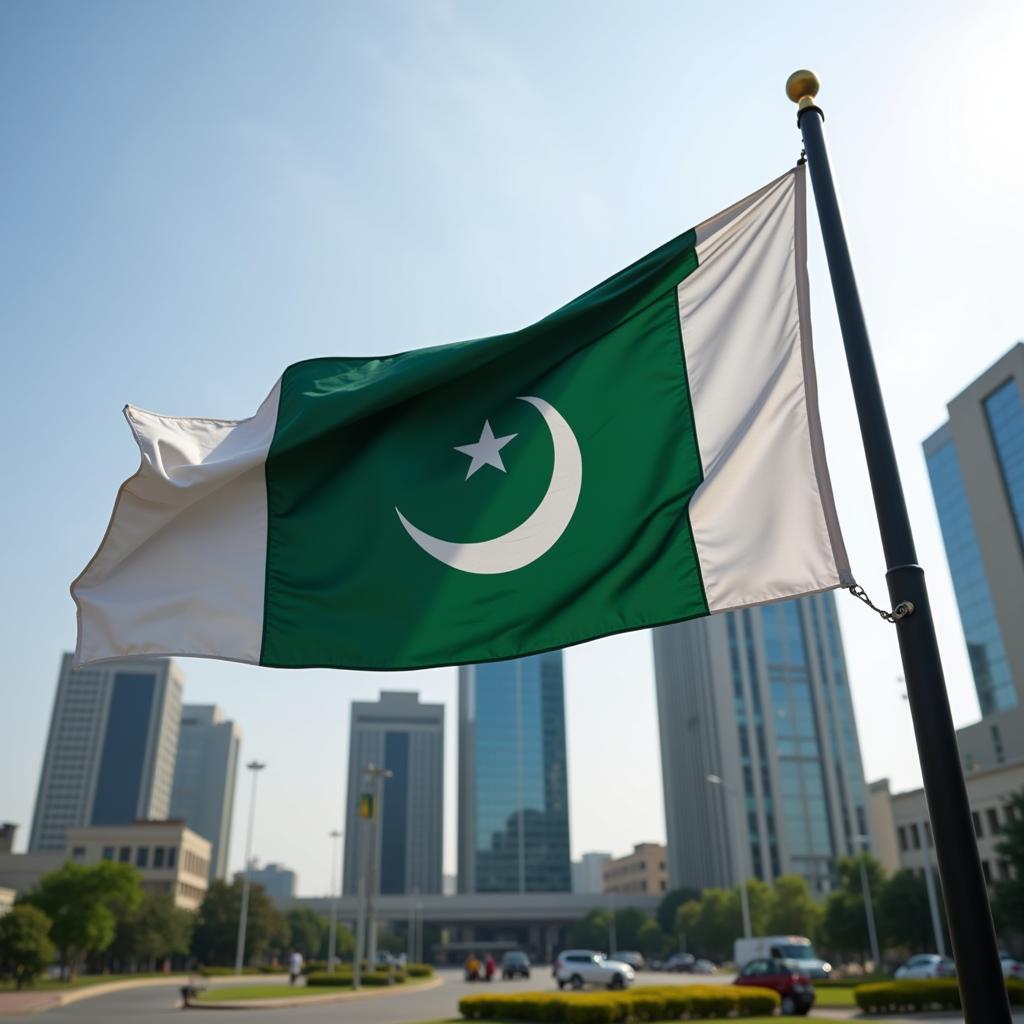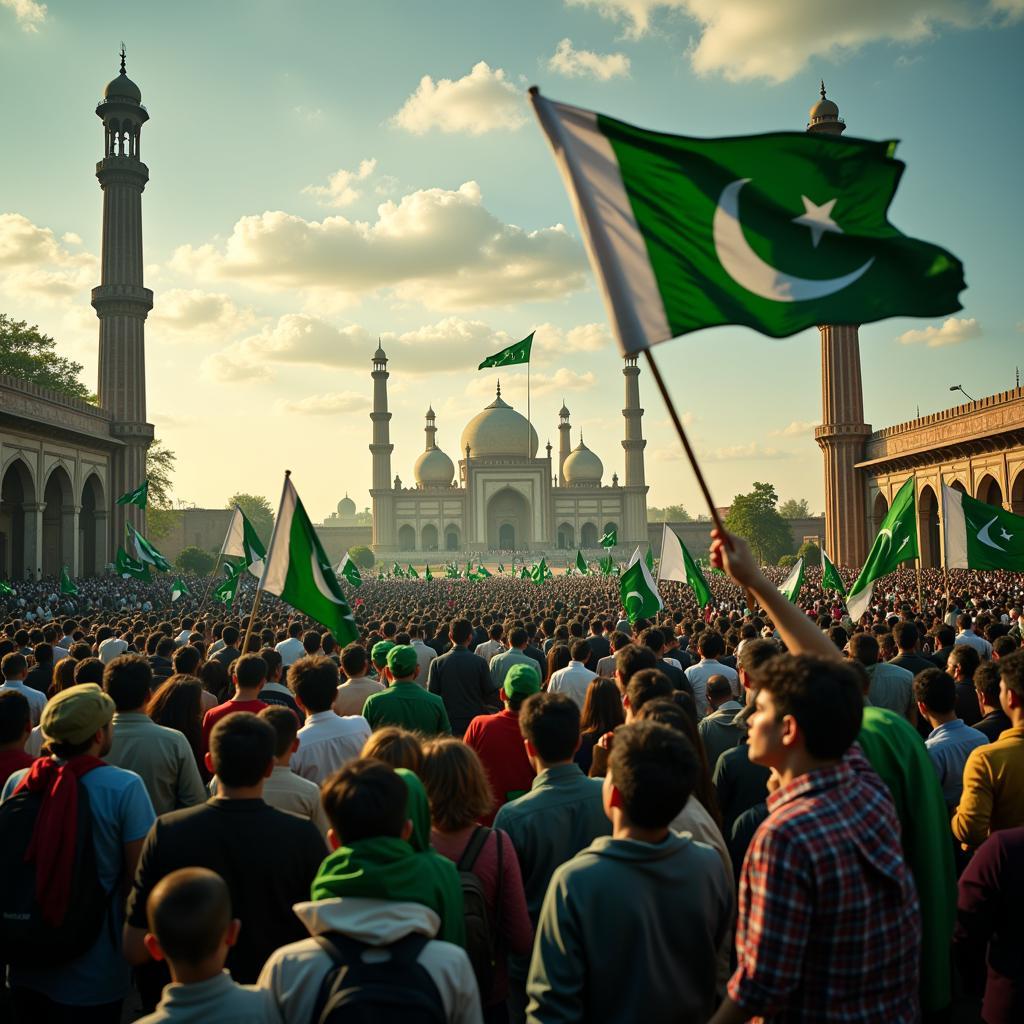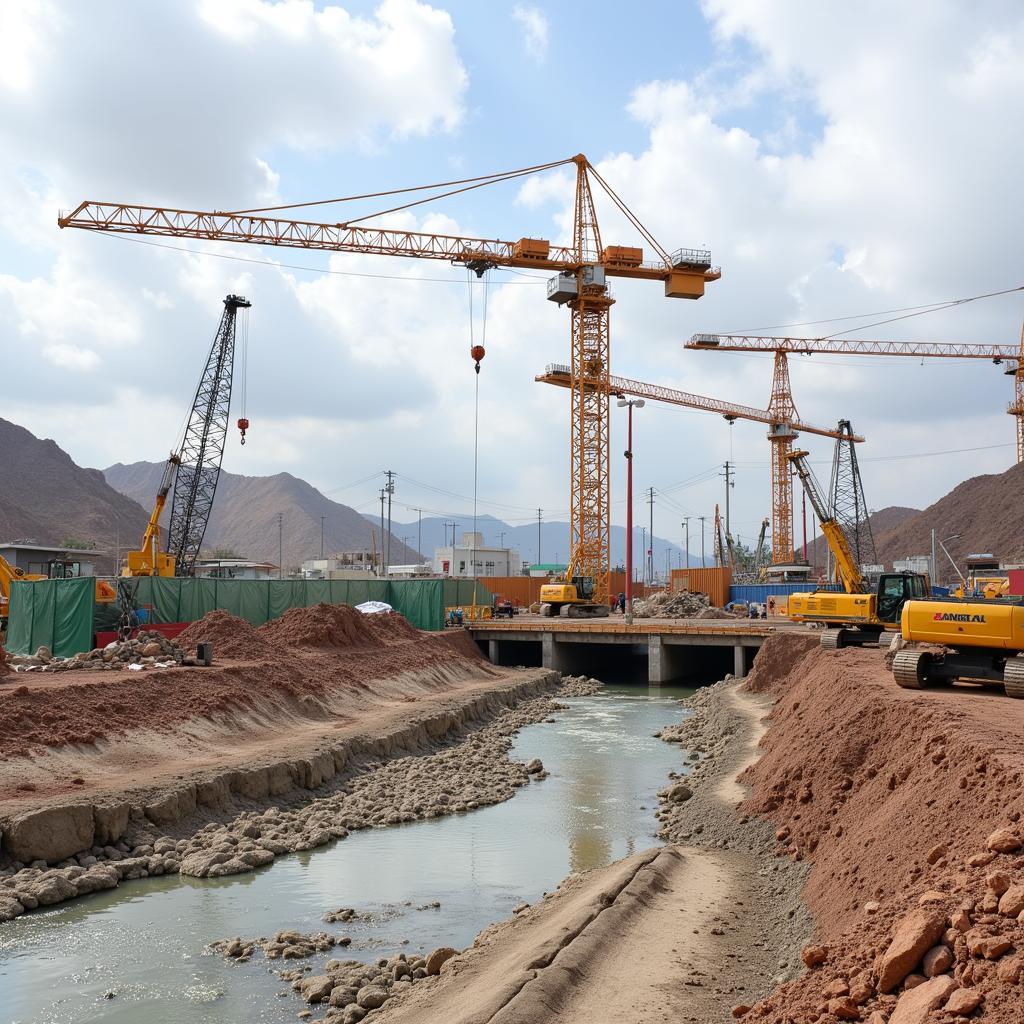The phrase “Pakistan Stand” encapsulates a multifaceted concept that goes beyond a mere geographical location. It embodies the values, aspirations, and strategic positioning of Pakistan on the world stage. This article delves into the core elements shaping Pakistan’s stand, exploring its historical context, evolving national identity, and contemporary foreign policy objectives.
 Pakistani flag waving proudly in Islamabad
Pakistani flag waving proudly in Islamabad
A Legacy Forged in Resilience: Shaping the “Pakistan Stand”
The foundation of Pakistan’s stand lies in its unique birth as a nation. Carved out of British India in 1947, Pakistan emerged as a homeland for the Muslims of the subcontinent. This historical event not only defined its geographical boundaries but also instilled a strong sense of identity rooted in Islamic principles and the struggle for self-determination. The “Pakistan stand”, from its inception, was intrinsically linked to the pursuit of a sovereign and prosperous nation.
 Crowds gather for Pakistan Independence Day celebration
Crowds gather for Pakistan Independence Day celebration
Navigating a Complex Geopolitical Landscape
Pakistan’s geopolitical location has significantly shaped its stand on international affairs. Positioned at the crossroads of South Asia, Central Asia, and the Middle East, Pakistan occupies a strategically vital region. This unique positioning has brought both opportunities and challenges, influencing Pakistan’s foreign policy outlook and shaping its approach to regional and global issues.
Balancing Regional Dynamics and Global Partnerships
Pakistan’s foreign policy has consistently emphasized the principles of peaceful coexistence, regional stability, and mutually beneficial partnerships. The pursuit of these objectives has led Pakistan to cultivate strong ties with countries in the Muslim world, foster economic cooperation with regional neighbors, and engage in strategic dialogues with global powers.
 Construction underway on a Pakistan-China Economic Corridor project
Construction underway on a Pakistan-China Economic Corridor project
Key Pillars of the “Pakistan Stand”
Several key themes emerge when analyzing the various facets of the “Pakistan stand”:
- Emphasis on Sovereignty and Territorial Integrity: Pakistan’s history has underscored the paramount importance of safeguarding its sovereignty and territorial integrity. This principle guides its stance on issues like Kashmir and its firm opposition to any form of foreign interference in its internal affairs.
- Commitment to Islamic Values: As the world’s second-largest Muslim-majority country, Islam plays a pivotal role in shaping Pakistan’s national identity and worldview. This commitment is reflected in its domestic policies, its engagement with the Muslim world, and its advocacy for the rights of Muslim communities globally.
- Pursuit of Economic Development and Prosperity: Pakistan’s stand is also deeply rooted in its aspirations for economic growth and prosperity. The nation seeks to leverage its strategic location, enhance regional trade, attract foreign investment, and create opportunities for its growing population.
Challenges and Opportunities in a Changing World Order
The 21st century presents both challenges and opportunities for Pakistan. The evolving geopolitical landscape, the rise of new global powers, and the increasing interconnectedness of the world demand a nuanced and adaptive approach to international relations. Pakistan continues to navigate these complexities, striving to secure its interests while contributing to regional and global peace and stability.
Conclusion: A Stand Defined by Resilience and Aspiration
The “Pakistan stand” is a dynamic concept, constantly evolving in response to internal and external factors. It represents a nation determined to chart its own course, driven by the values of its people and a vision for a prosperous future. As Pakistan continues to navigate the complexities of the 21st century, its stand on the world stage will undoubtedly remain a subject of significant interest and analysis.
FAQs about Pakistan’s Stand
1. What is the significance of the Kashmir issue for Pakistan?
The Kashmir issue holds immense significance for Pakistan, both historically and emotionally. Pakistan views the resolution of the Kashmir dispute as essential for lasting peace and stability in the region.
2. How does Pakistan balance its relationship with China and the United States?
Pakistan maintains a policy of non-alignment and seeks to cultivate mutually beneficial relationships with all countries, including both China and the United States.
3. What role does Pakistan play in the Organization of Islamic Cooperation (OIC)?
Pakistan is a founding member of the OIC and has played an active role in promoting unity, cooperation, and dialogue among Muslim-majority countries.
4. What are some of the key economic challenges facing Pakistan?
Pakistan faces challenges such as poverty, unemployment, and a need for greater investment in education and infrastructure.
5. How does Pakistan view the threat of terrorism?
Pakistan has been at the forefront of the fight against terrorism and remains committed to working with the international community to combat this global threat.
For more insights on related topics, you may find the following articles informative:
Please feel free to reach out to our 24/7 customer support team at +923337849799, [email protected], or visit our office located at Dera Ghazi Khan Rd, Rakhni, Barkhan, Balochistan, Pakistan for any assistance or further inquiries.